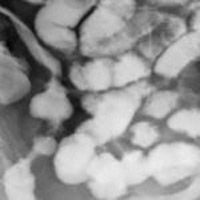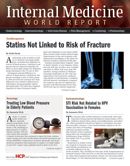Publication
Article
Internal Medicine World Report
Gastric Bypass and the Super Obese
Author(s):
When obese patients who want bariatric procedures have a body mass index (BMI) of 50 to 60, surgeons must decide which technique is best. These patients are challenging. About 25% of US patients with obesity are in this group.

When obese patients who want bariatric procedures have a body mass index (BMI) of 50 to 60, surgeons must decide which technique is best. These patients are challenging. About 25% of US patients with obesity are in this group.
So far there is no consensus on which works better, Roux-en-Y gastric bypass or biliopancreatic diversion with duodenal switch.
Scandinavian researchers report that duodenal switch had better results in that patients lost more weight. But they also had more complications.
“We recommend the duodenal switch be used with caution owing to a higher rate of additional surgical procedures and a risk of nutritional complications,” researchers Hilde Risstad MD said in a report in JAMA Surgery.
One conservative approach could be to start patients out with a sleeve gastrectomy then follow up with a duodenal switch only if the first procedure doesn’t result in enough weight loss, Risstad wrote.
With colleagues at Oslo University Hospital in Oslo, Norway and Sahlgrenska University Hospital in Gothenburg, Swede,n Risstad reported on the experiences of 60 severely obese patients.
Five years after surgery, the patients who had the duodenal switch procedure saw their BMI drop by a mean of 22.1 index points while in those with gastric bypass the drop was 13.6. The mean difference between the groups was 8.5 on the BMI scale.
Also, the researchers found, 5 years after gastric bypass, 56% of patients were still obese, with a mean BMI of 40.
But duodenal switch came with more side effects — sometimes severe ones.
Remission rates of type 2 diabetes, metabolic syndrome, and blood pressure changes were equal in the group. But serum concentrations of vitamin A and 25-hydroxyvitamin D were significantly reduced after duodenal switch compared with gastric bypass.
There were more adverse effects involving the gastrointestinal tract in the duodenal switch group and these patients also underwent more surgical procedures related to the original surgery.
Four patients in the duodenal switch group had to be admitted to the hospital because of malnutrition and 3 of them had severe diarrhea. Revision surgery failed to help one of those patients.
Anemia requiring blood transfusions was reported in 5 duodenal switch patients and in one who had gastric bypass.





